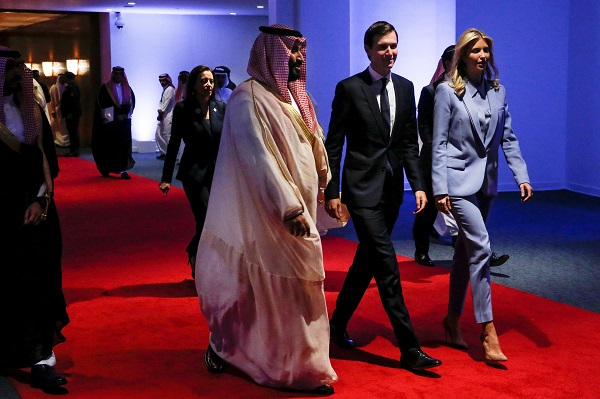Ahlulbayt News Agency: In the last weeks of Trump’s presidency, it seems that the American administration has put its focus on West Asia policy as senior American political and military leaders intensify their visits to the region.
After the relatively lengthy and controversial tour of the Secretary of State Mike Pompeo, the White House has now decided to send Jared Kushner, Trump’s advisor and son-in-law, to the region. Kushner’s main task is to try to put an end to the crisis in the (Persian) Gulf Cooperation Council that started in June 2017 when Saudi Arabia, assisted by Egypt, the UAE, and Bahrain, cut off ties with Qatar and imposed a blockade on it.
In recent weeks, Washington has ramped up its push to restore peace between the blockading states and Doha. Robert O’Brien, the US national security advisor, on November 17 hoped that the three-year crisis will end “in the next 70 days.” On the same day, Sheikh Mohammed bin Abdulrahman bin Jassim Al Thani, Qatar’s foreign minister and deputy prime minister, held that his country since the beginning of the crisis kept the dialogue door open and that the crisis had no winner.
In addition to Qatar’s expression of readiness, the victory of Joe Biden in the US presidential election and his tough stances on Riyadh and Crown Prince Mohammed bin Salman push the Saudis towards seeking waysa a solution to the dispute with Qatar in expectation of the change in the upcoming US administration approaches compared to Trump’s. Financial Times said that after Trump’s defeat, Riyadh accelerated the efforts to settle the crisis with Qatar.
Bin Salman’s anticipation of cold ties with the upcoming US administration can be even more serious if we know that Qatar has promoted its efforts to pursue the case through international institutions. On Thursday, Doha, referring to the rulings issued by the international organizations like the International Court of Justice (ICJ) in rejection of the claims made by the blockaders, asked the United Nations Security Council condemn the "unilateral, coercive and illegitimate measures that the blockading countries continue to impose" on Doha for over three years.
"These coercive measures violate the United Nations General Assembly resolutions, and have resulted to date in detrimental social and humanitarian repercussions affecting the citizens and residents of the State of Qatar, in addition to numerous human rights violations," Alena Douhan, the UN Special rapporteur said after her recent visit to the Persian Gulf emirate.
This comes while many believe that with Trump's departure, the White House will assist the Qataris in their push for UN condemnation of the Saudis and their Arab allies, while pressures are severely growing on the Arab kingdom to end its bloody and devastating war against neighboring Yemen.
Trump thirsty for achievements
The predicament bin Salman is facing causes Trump to embark on more active diplomacy to solve the intra-Arab crisis in the remaining time of his term all to give weight to his foreign policy record and prevent the Democrats from claiming credit for the solution of the crisis.
Many believe that Trump’s insistence on repeating his massive election fraud claims even after his green light to the Biden team to start the power transition process comes intending to damage the Biden administration’s legitimacy and pave the way for the victory of himself or another Republican in the 2024 elections. At the same time, team Trump hopes that solution to the crisis can help speed up the Arab-Israeli normalization.
Opening the way for normalization
The US officials think that putting strains on Saudi Arabia to sign a normalization deal with the Israeli regime makes other Arab states follow suit. But according to reports, at a recent meeting between Pompeo, bin Salman, and Netanyahu in the new Saudi city of Neom the Saudi crown prince showed no signs the kingdom is going to join the thaw process under Trump.
But while Pompeo left Riyadh and the region empty-handed, the White House sounds upbeat about Kushner’s capability of untying the knot of the Persian Gulf crisis to push the normalization forward.
Kushner is accompanied by the US Representative to the International Negotiations Avi Berkowitz. During the visit of the American-Israeli delegation to Manama, Bahrain, Berkowitz, when asked about the Saudi plans to follow suit, said “that is a decision for them to ultimately come to, our conversations with them have been positive on numerous fronts.” “We look to them for an understanding in the region of the temperature of how things are going on numerous fronts, we’ve had very good discussions with them but time will tell,” he added.
But firstly, Kushner has highly close ties with bin Salman and this is the major reason behind his dispatch to the region. The Israelis find the Persian Gulf crisis as one of the main obstacles ahead of the normalization process. This even concerns the Saudis who are afraid from Qatari political exploitation of the internal and regional opposition to normalization with Tel Aviv. Qatar’s foreign minister recently highlighted the negative impacts of the normalization on the efforts to form a Palestinian government in a bid to discredit the UAE justifications for agreement with Tel Aviv. The significance of this issue can become clear to us if we know about Qatar’s media power thanks to the Aljazeera news network and the ideological sway over the Muslim Brotherhood groups not only in the region but in the world.
Secondly, Kushner’s trip follows two important developments in the region: Another attack on the Saudi oil giant Aramco facilities by Yemeni Movement Ansarullah’s missiles and also the assassination of the eminent Iranian nuclear scientist Mohsen Fakhrizadeh on Friday. Apparent enough, the White House representatives make use of Riyadh’s vulnerability in the confrontation of the Yemenis especially in its strategic oil facilities and Bab-el-Mandeb strategic waterway as privileges to bring the Saudis aboard the normalization process for strengthening the regional coalition against the Axis of Resistance.
/129

